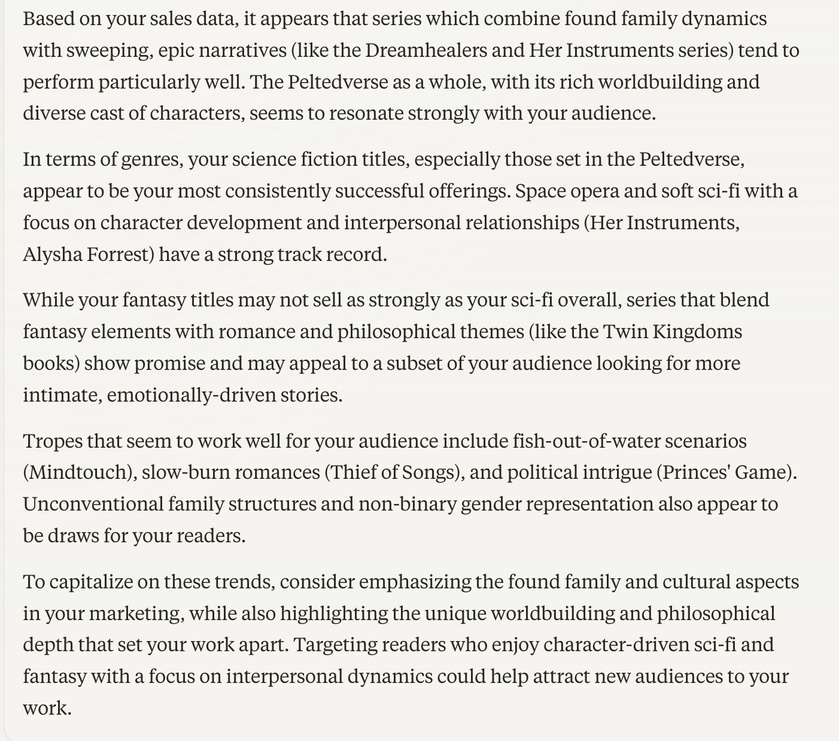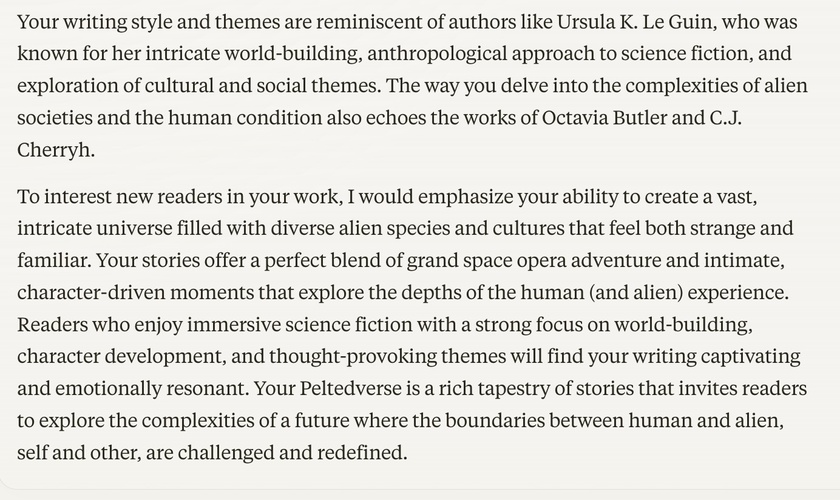Resistance is Futile: The Jaguar's AI Experiment (Patreon)
Content
Yes, it’s true: after much gnashing of teeth and a token resistance to the inevitable, I decided it was time to do serious experimentation with AI, especially after hearing multiple reports, all good, about Anthropic’s Claude. To be clear, I continue to think the legal repercussions of the training of AI models on unlicensed intellectual property (whether that’s visual art, fiction or nonfiction, music, etc) need to be hashed out… and we need to decide now who owns a person’s voice, face, and personality to protect against the use of deepfakes to defame people or defraud their loved ones.
None of that, however, changes that Artificial General Intelligence (AGI) and LLMs (Large Language Models) are not going anywhere, and are already changing things. I would rather not be drowned by the tidal wave of revolution, so for once I’m trying to surf the initial waves. “What can AI possibly do for me, if I don’t want it to write my books or draw my pictures?” I wondered, and my loved ones said, “Why don’t you find out instead of guessing?” (I am surrounded by smart people.)
This ended up being a perfect time to experiment because (by accident!) I had a problem that needed solving: I want to set up a sales website so people can shop from me directly instead of buying from Etsy or Bandcamp or Amazon. I’d just read a book that broke down the tiers of products you want to offer, from freebies to lure in new readers, all the way to premium purchases that will only be attractive to superfans. Since my book catalog alone is over 70 titles, brainstorming what things to put in what categories sounded less like fun and more like shoveling the Augean stables. I had just signed up for Claude, so I figured: why not see if it can figure these things out for me?

Its initial suggestions were generic based on the information I gave it—that I was an author, of 70 books, mostly science fiction, but some fantasy, children’s, romance, and nonfiction. I was also a painter. I was intrigued by the fact that it knew that ebooks made good low tier products based on price, and that premium offerings should involve autographs, special editions, or bundling with themed art or merchandise… but it was too non-specific for me.
Which is when I fell down the rabbit hole. I discovered I could feed it my list of published works. Then my book catalog with all the covers and descriptions and tags. I gave it all-time sales data from my retailers… and then bandcamp… and then etsy… and then all my kickstarter data. I even gave it website traffic information, patreon and locals stats, and social media follower counts. With every file I fed it, I asked it to refine its ideas on how I should be positioning, bundling, and marketing my products. I asked it what underperforming books might be promising if presented to some new audience. I even asked it to find recurring themes across all my books and use that information to create marketing copy for new readers.
Every so often I’d stop to ask it ancillary business questions, like “My large backlist can be intimidating to new readers. How do I attract them despite that?” or “I write in diverse genres, which makes my work difficult to market. How can my broad writing range be used as a strength, instead of a weakness, and how can I make new readers interested in all my offerings?” And it continued to give me sensible ideas, many of which I had already thought of, along with a few I hadn’t.

Already I had to stop and marvel at how bizarre it was that a computer was just spouting off all this stuff in response to questions. Where does it get these answers? How does it construct them? How does it know what words mean?? It is completely inscrutable, but the interaction feels so normal that you keep going. So I did.
By the end of that conversation, Claude knew not only which of my books and settings were bestsellers, it gave me excellent guesses on which of my themes or tropes were doing best in the market, and had used that information to craft a set of offerings for my (as yet unrealized) shop that would not only attract people with the tried-and-true series, like Dreamhealers and Her Instruments, but also tempt people with the promising but underselling ones, like Thief of Songs. “Narrow that down to ten initial offerings,” I told it, “because I want to launch my store with a limited number of items to get my feet wet.” Which it did, and they were all reasonable ideas. And I went to sleep (or tried), feeling like I’d completely underestimated the utility of LLMs. I had started the day with a tedious task I hadn’t wanted to do that required knowledge of my entire product catalog and how my art and writing interacted over the 25+ years I’d been making things, and Claude had learned enough to do it for me.
Here, friends, is the wildest part.
When I woke up at 4 am (thank you, orange cat), I remembered that while researching Shopify, I’d read that they supported bulk upload of products by means of a CSV file (which can be turned into a spreadsheet). There was a template online with sample products in it. I wondered suddenly if Claude could create a bulk upload spreadsheet for me. So I got up before dawn, fed it the sample file from Shopify, and told it to fill it in with the paid products it had brainstormed, excluding the free offerings, and generate a CSV file I could upload.
…and it did. When I cut and pasted the output and saved it as a CSV file, Excel opened it and it was perfectly formatted. Claude had even added product codes, tags, descriptions, and SEO and Google adword information.

Was it perfect? Of course not. But it had done most of the grunt work, leaving me to the far more reasonable task of adjusting things here and there.
I was floored. Every description I’d heard about LLMs so far had made them sound like toys. I don’t want AI generated images. I don’t care if it can brainstorm creative ideas, or suggest ways to fix my novel. Every time I asked about business cases, I heard back ‘oh, it can’t do that yet’ so I shrugged it off. But it’s been less than half a year since I started asking about business cases, and Claude just handled an extremely annoying and pertinent one for me, the day I started using it. This is astonishing. I don’t know if we’re still saying ‘I can’t even’ or if that’s passe, but… I really can’t even.
Have I done nothing but experiment with this tech for two days? Indeed, I have. I might have skipped three hours of sleep to do it, too.
There are a lot of limitations on this technology, especially if (like me) you have so much data that you casually break its file limits. But LLMs are evolving so fast that I wonder not if that will be fixed, but how quickly. And it’s certainly still the Wild West out there, with various competing AIs that are good at some things and bad at others. Figuring out which one will work for you isn’t a minor task. But it’s clear to me that this technology is not only coming, it’s going to be indispensable, and I’m glad I’m surfing this wave.
Bonus: you can also use it to shore up your confidence when you’re feeling bad. XD

So there you have it, my first adventure with LLM. Should I keep talking about this? What kind of boring things do you hope AI will automate for you?
